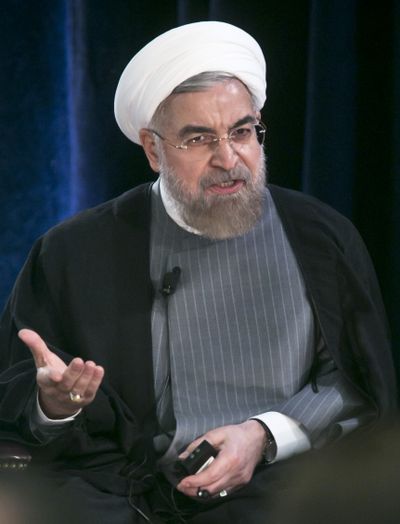Iran president: U.S. should focus on Islamic State, not nuclear arms

NEW YORK – Iranian President Hassan Rouhani urged the United States on Wednesday to move beyond “insignificant” fears that his country seeks nuclear arms and challenged it to join his country in battling what he described as the global threat of Islamic extremism.
Rouhani also made clear he was not prepared to interfere in the case of Jason Rezarian, an American-Iranian journalist detained on unspecified charges in Iran, during a speech and question-and-answer session hosted by the New America think tank.
But most of his comments focused on the menace posed by the Islamic State terror group and attempts by his country and the U.S. to seal a deal to meet White House demands that Iran agree to significant long-term curbs on its nuclear program that could be used to make weapons in exchange for an end to crippling sanctions.
The Iranian president is addressing the U.N. General Assembly today, and his comments Wednesday touched on some of the issues he is likely to highlight.
The nuclear talks appear stuck two months before their extended Nov. 24 deadline. While the U.S. is formally joined by five other powers at the negotiating table with Iran, it is clear that the Americans are the lead negotiators, and Rouhani directed most of his comments at Washington.
He urged the U.S. government to “let go of pressure politics toward Iran” – a reference to Iranian complaints that Washington’s demands at the talks are unrealistic. Repeating that Iran is not interested in nuclear arms, he urged the U.S. to “leave behind (this) insignificant issue.”
Instead, Rouhani said, the two countries must focus on the fight against the Islamic State group and other extremist groups, the “real and serious common challenges which … threaten the entirety of the world.”
At the same time, he was critical of the U.S. bombing campaign of Islamic State strongholds in Iraq and Syria and the growing coalition of countries seeking to stop the extremists by military means. “Bombing and airstrikes are not the appropriate way,” he said, warning that “extraterritorial interference … in fact only feeds and strengthens terrorism.”
Blaming “the misunderstandings of the realities of the region by … outsiders,” Rouhani said wrong U.S. policies, including the invasions of Afghanistan in 2001 and Iraq in 2003, likely led to the birth of the Islamic State group by creating power vacuums exploited by the extremists.
He also suggested it was in the West’s interest to reach a nuclear agreement with Iran, freeing Tehran to play a more active role in creating and maintaining stability in the Islamic world.
Even if a nuclear deal is sealed, it could face harsh opposition by Iranian hardliners and U.S. congressional critics united in one fear – that their side has given away too much. But Rouhani shrugged off opposition from inside his country and said it was up to President Barack Obama to deal with Congress.